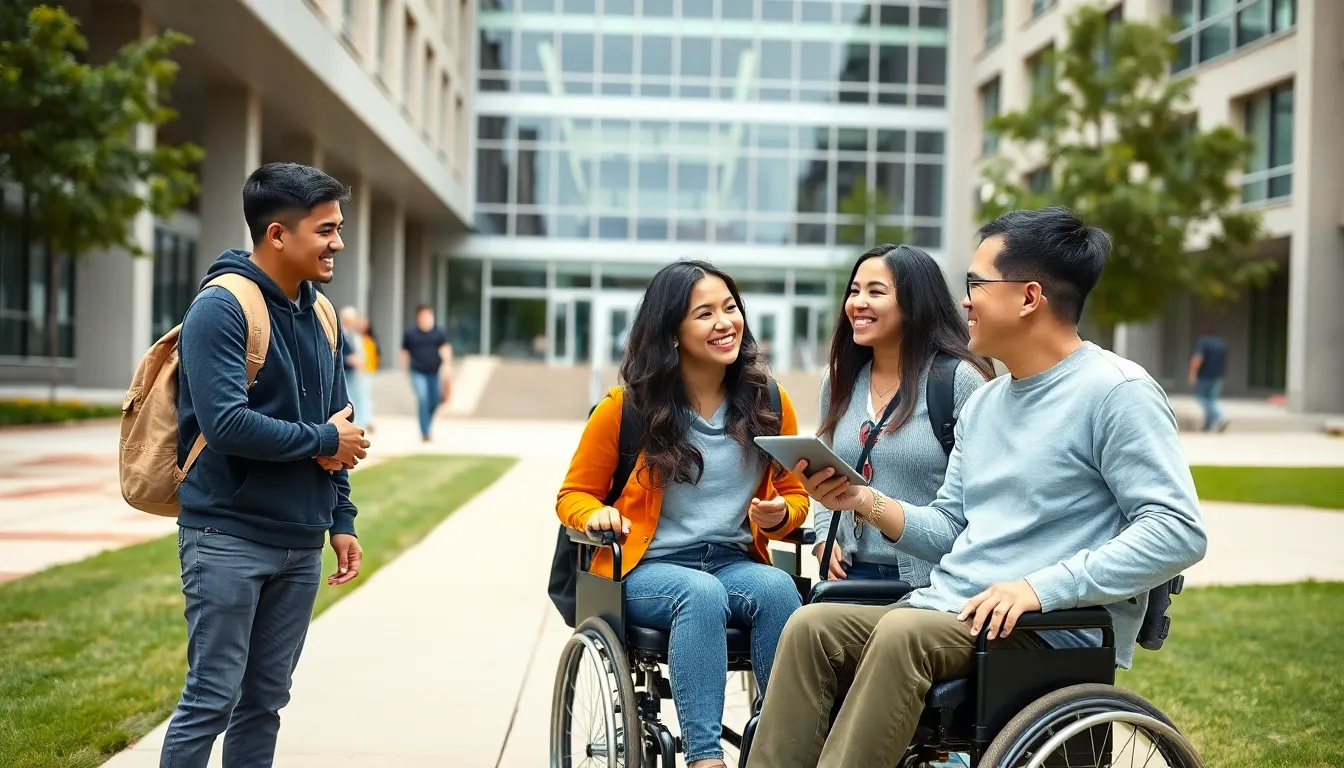Table of Contents
ToggleImagine walking onto a college campus, where the excitement of new opportunities buzzes in the air. But for some students, the journey might feel like navigating a maze with no map. So, is there special education in college? The answer isn’t as straightforward as a pop quiz on a Monday morning.
Understanding Special Education
Special education in college takes a different form compared to K-12 education. Colleges and universities provide accommodations rather than specialized education programs. These accommodations support students with disabilities in navigating academic challenges.
Disability services offices often exist on college campuses, serving as key resources. Staff members help students understand their rights and access necessary accommodations. Examples of accommodations include extended test time, note-taking assistance, and prioritized course registration.
Colleges also promote inclusive environments. They encourage accessible classrooms, which benefit all students, not just those with disabilities. Furthermore, some institutions offer workshops or counseling services focused on self-advocacy and adjustment to college life.
Support varies by institution, so students must research specific college policies. Community colleges may differ significantly from large universities in their level of support. Understanding these differences aids students in choosing a suitable college.
While special education as a concept may not exist in colleges, resources remain available. Students are entitled to receive reasonable accommodations, which improve their educational experience. Advocacy plays a crucial role in ensuring equal access to educational opportunities.
Lastly, transitioning from high school to college can prove challenging for students with disabilities. They must become proactive in seeking support, understanding their rights, and utilizing available resources. Emphasizing self-advocacy enhances their chances of success in the college environment.
The Need for Special Education in College

Universities recognize the importance of providing support for students with disabilities. Accessibility and inclusion are critical components of this commitment.
Accessibility and Inclusion
Colleges strive to create environments that accommodate all learners. These institutions often implement architectural modifications like ramps, automatic doors, and accessible restrooms. Additionally, they offer alternative formats for course materials, ensuring everyone can engage fully. Many campuses have designated accessibility offices responsible for upholding these standards. Such offices assess individual needs and implement necessary adjustments. This proactive stance helps foster a culture of inclusion, where diverse talents can thrive.
Support Services Available
Support services play a vital role in helping students succeed academically. Most colleges provide disability services offices that assess and facilitate accommodations. Common resources include extended test-taking time, alternative exam formats, and priority registration. Academic coaching and mentoring are also available, helping students navigate challenges effectively. Some colleges partner with mental health services to address emotional and psychological needs. With these resources in place, students can focus on their studies and reach their full potential.
Special Education Programs in Colleges
Colleges provide various programs and support structures to assist students with disabilities. These initiatives aim for inclusivity and academic success.
Types of Programs
Support services focus on providing reasonable accommodations tailored to individual needs rather than traditional special education models. Academic coaching, counseling services, and peer mentoring programs enhance student experiences. Some colleges offer learning disability assessments to identify specific challenges. Resource centers frequently provide technology tools like speech-to-text software. Workshops on self-advocacy and time management equip students with essential skills for their academic journey.
Notable Institutions Offering Support
Several institutions stand out for their commitment to supporting students with disabilities. University of California, Berkeley, offers comprehensive disability services, including personalized accommodations. University of Arizona hosts an experiential learning program designed for students with disabilities, enhancing their college experience. Northeastern University excels with its vibrant network of disability services, offering tailored academic support and mentorship opportunities. These colleges demonstrate an ongoing commitment to fostering inclusive educational environments that promote equity for all students.
Challenges Faced by Students
Students with disabilities encounter various challenges in college environments. Social barriers often emerge from a lack of awareness among peers. Academic pressures increase due to the higher demands of college coursework. Some students struggle with communicating their needs for accommodations. Isolation can stem from feelings of being different or misunderstood. Difficulty in adjusting to the pace of college classes also presents hurdles. Many students find that existing support networks from high school no longer apply.
Social and Academic Barriers
Social integration poses significant challenges for students with disabilities. Events like group projects can create anxiety, especially when communication issues arise. Navigating campus environments that may not be entirely accessible can lead to frustration. Academic barriers frequently include a sudden increase in workload, impacting time management skills. Limited interaction with faculty members may hinder relationships vital for academic support. When navigating these challenges, students often need to advocate for themselves to receive necessary resources.
Solutions and Resources
Colleges provide several resources to help students with disabilities thrive. Disability services offices offer personalized consultations to discuss accommodations. Many institutions implement workshops focused on self-advocacy and effective communication strategies. Peer mentoring programs facilitate connections with other students to share experiences and advice. Academic coaching supports time management and study skills tailored to individual needs. Technology services often include assistive tools designed to aid learning. Most colleges prioritize creating supportive environments through training for faculty and staff on disability awareness.
Navigating college as a student with a disability presents unique challenges and opportunities. While the landscape of special education shifts from K-12 to higher education, the focus remains on providing essential accommodations that promote success.
Students are encouraged to take charge of their educational journeys by utilizing available resources and support systems. Institutions are increasingly dedicated to fostering inclusive environments that empower all students.
With the right tools and support, those with disabilities can thrive academically and socially, making the most of their college experience.




